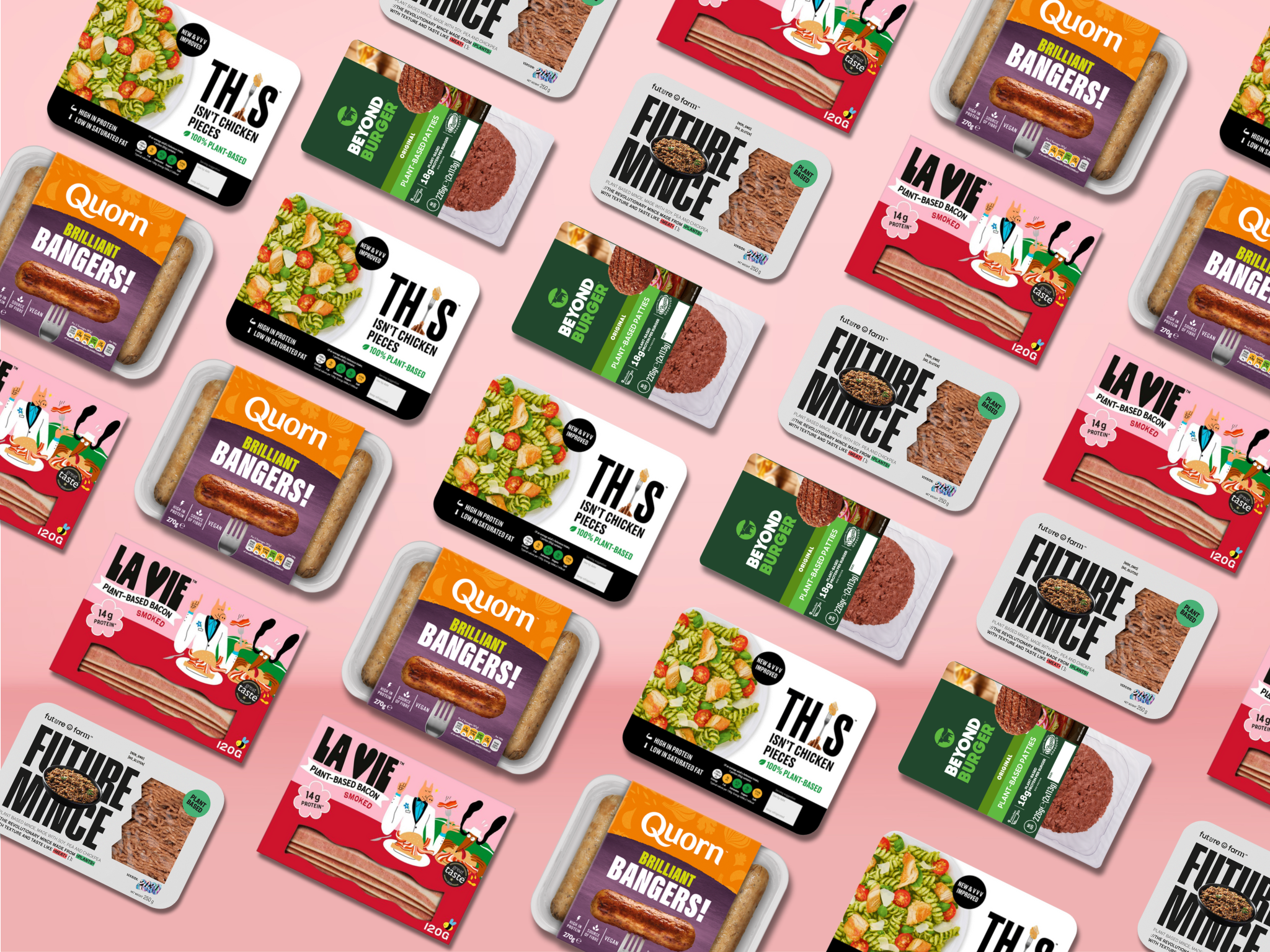Plant-Based Meat Better for Human & Planetary Health Than Animal Proteins, Finds New Study
7 Mins Read
New analysis by the Food Foundation shows that plant-based meat is better for the planet and mostly healthier, with traditional proteins like beans or tofu the most optimal options.
Plant-based burgers, sausages and nuggets are much more climate-friendly and largely better for human health – but their progress is hindered by a price premium, a new study by the UK’s Food Foundation has found.
While the environmental benefits of plant-based proteins are well-known – especially in high-income countries – the conversation around their health credentials has been skewed and misleading, and needs “much greater nuance”.
The report revealed that plant-based meats and traditional plant proteins like beans, grains, tofu and tempeh all have significantly lower greenhouse gas emissions than animal-derived meat. The same is true for water use (barring rice). Meanwhile, vegan proteins also contain fewer calories, less saturated fat, and higher fibre levels than meat products.
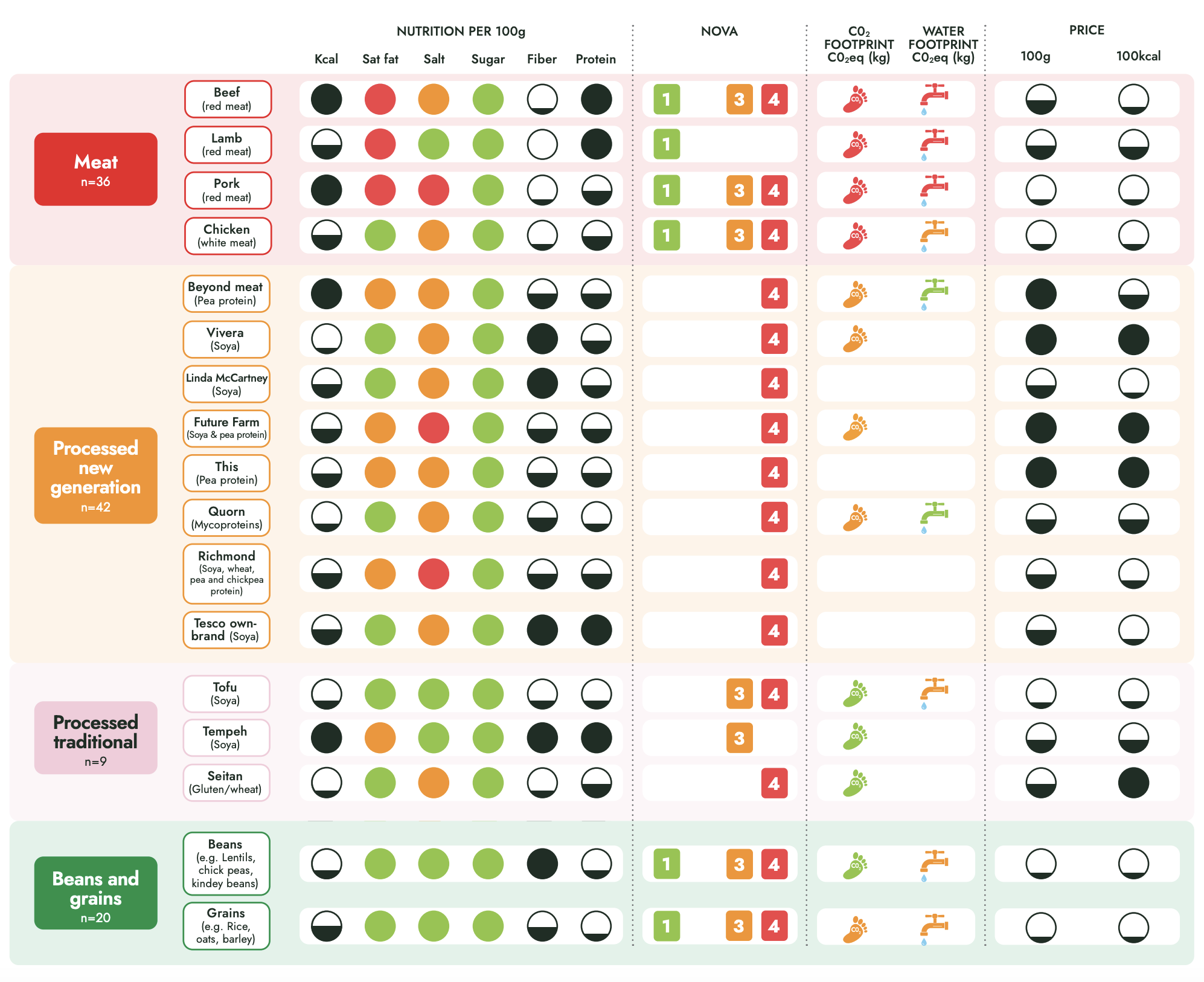
The Food Foundation split plant proteins into three categories: new-generation analogues, traditional proteins (both classed as processed), and beans and grains (which are less processed or unprocessed). It analysed 67 plant-based products and compared their climate, nutrition and price attributes to 46 meat products.
Beyond Meat, Quorn, THIS, La Vie, Richmond, The Tofoo Co and Tesco’s private label were among the brands included in the report, which looked at everything from burgers and sausages to chicken fillets and nuggets.
Beans and grains like chickpeas, rice, oats and lentils were on average the strongest-performing foods on all three fronts of sustainability, nutrition and price, and thus should be “an important part of strategies” to support dietary shifts. That said, in the short term, “like-for-like meat substitutions are likely to offer a realistic and feasible transition pathway”, the report suggested.
Plant proteins: a solution for UK’s fibre deficiency
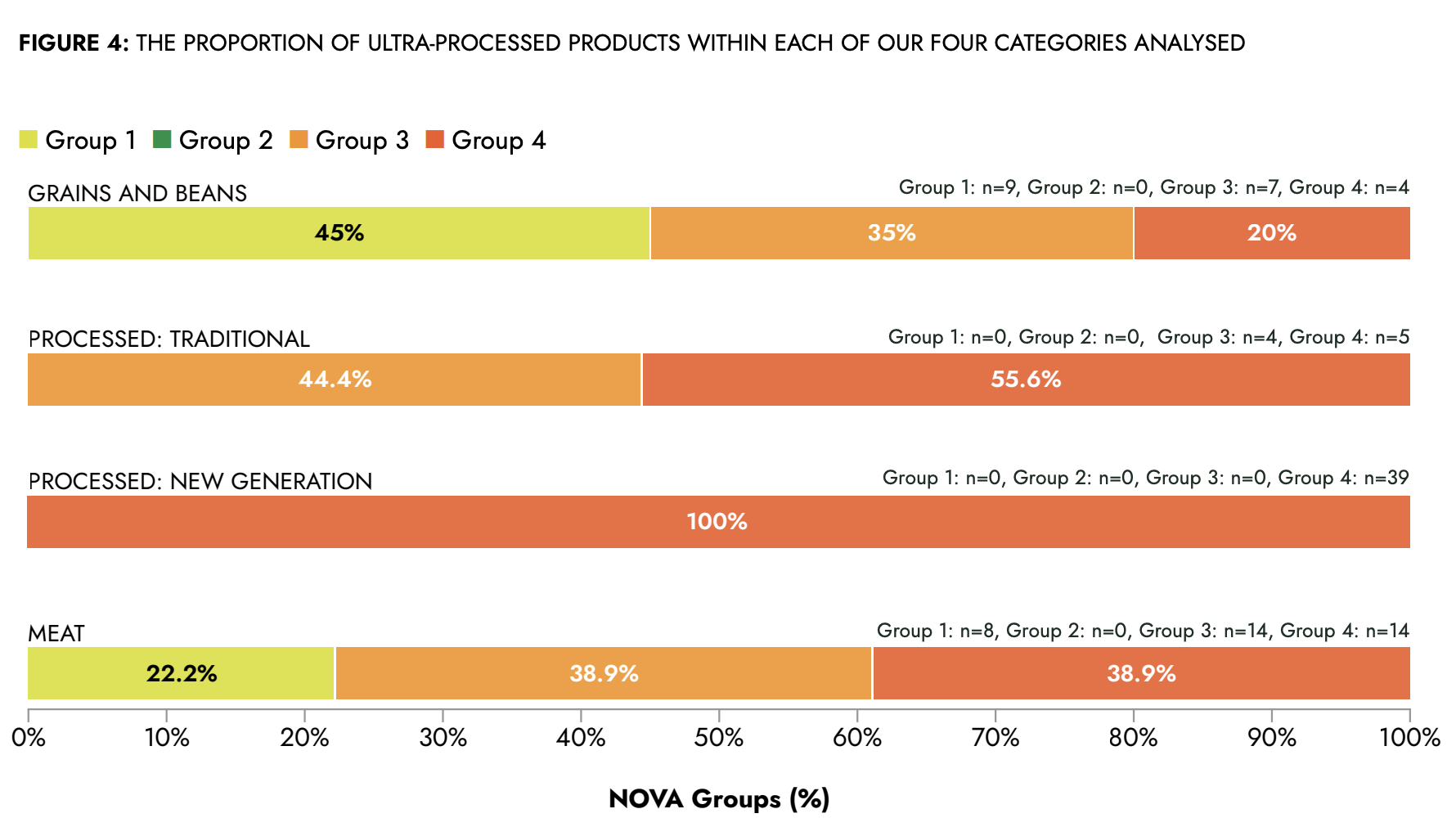
According to the research, the number of plant-based meat options far exceeds products offering traditional proteins like tofu or tempeh. And the proportion of ultra-processed food (UPF) – a thorn in the side of the vegan food industry – in each category also varies considerably.
While misleading media coverage has bred consumer confusion about UPFs – in the UK, an equal share of consumers believe UPFs are healthy and unhealthy, despite these foods making up 57% of the average British diet – the report pointed out that suggestions of plant-based meat being unhealthy solely because they’re UPFs are wide of the mark.
“Even plant-based alternatives with good nutrient profiles based on traditional nutrient profiling models, such as mycoprotein (Quorn), can be classed as UPFs,” the researchers wrote, adding that a 2023 study found positive health impacts from the intake of ultra-processed meat analogues.
While plant proteins were found to be lower in protein than meat, this difference was only marginal. And in any case, the UK doesn’t have any protein deficiency issues at a population level, the report said. In fact, Brits are overconsuming protein, with men and women eating 29g and 22g more of it, respectively, than is recommended by the British Nutrition Foundation.

The biggest gain for plant-based meats and traditional proteins comes with fibre intake, a nutrient the UK is not consuming enough of. On average, conventional meat products only have 0.5g of fibre per 100g, versus 4.7g for vegan meats, and 5.1g for grains and beans.
But while tofu, beans and the like have minimal levels of salt, plant-based meat products have higher salt levels than animal proteins (1.3g vs 1.1g, respectively). The report also found that only a third of the meat analogues analysed are fortified with iron and vitamin B12. This leaves room for improvement: brands could enhance the health credentials of vegan meats by improving fortification and reformulating them to reduce salt content.
However, certain products are already outperforming their animal counterparts. Vegan bacon has on average 1g more protein per 100g, while plant-based meatballs have 1g lower salt content compared to their livestock-derived equivalents.
Light on the planet, heavy on the wallet
The Food Foundation cites figures from Our World in Data to show that meat production has an outsized impact on the planet. Beef (from beef herds) is by far the most polluting protein, followed by lamb and beef from dairy cows.
But even chicken – often floated as a ‘sustainable’ meat option – has more than twice the emissions impact of rice and Beyond Meat, and emits three times more greenhouse gases than Quorn and Future Farm.
Similarly, beef is the most water-intensive food analysed in the report, followed by rice and other animal proteins. The rest of the plant proteins use much less water – Quorn’s water consumption is 97% lower than beef, while Beyond Meat’s water footprint is 99% smaller.
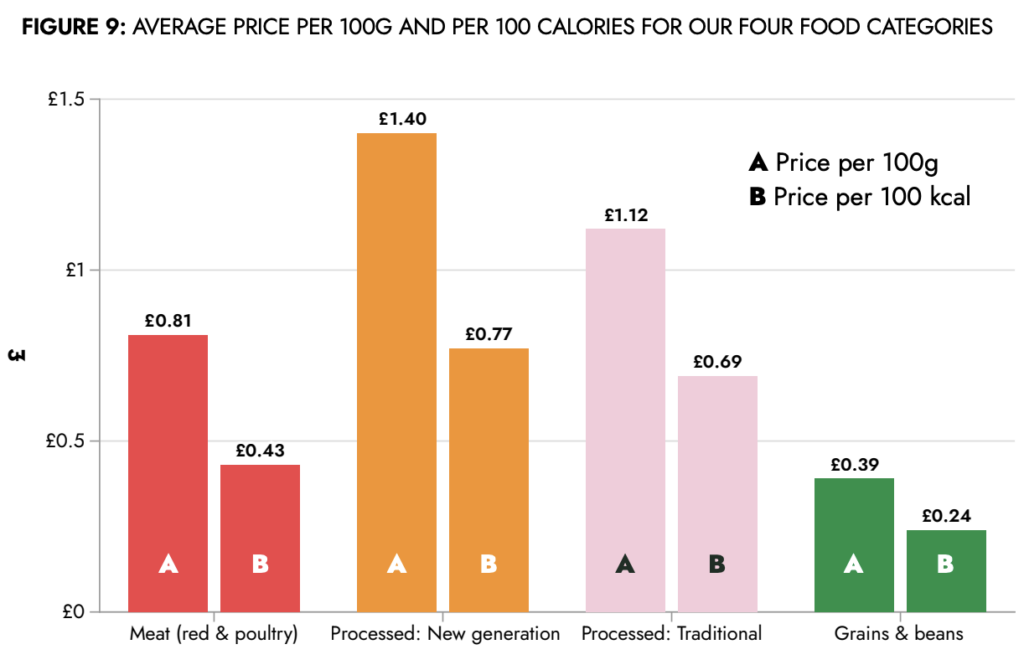
But while plant-based meats and proteins delivered plenty of wins on the health and environment fronts, their prices for consumers leave a lot to be desired. Meat analogues and plant proteins (like tofu and tempeh) are 73% and 38% more expensive than conventional meat products, respectively, with only grains and beans turning out cheaper (-52%).
Vegan bacon has the highest price premium, with these products almost three times more expensive than animal-derived versions. On the other hand, plant-based meatballs and mince are almost at price parity, costing only 7% and 14% more, respectively.
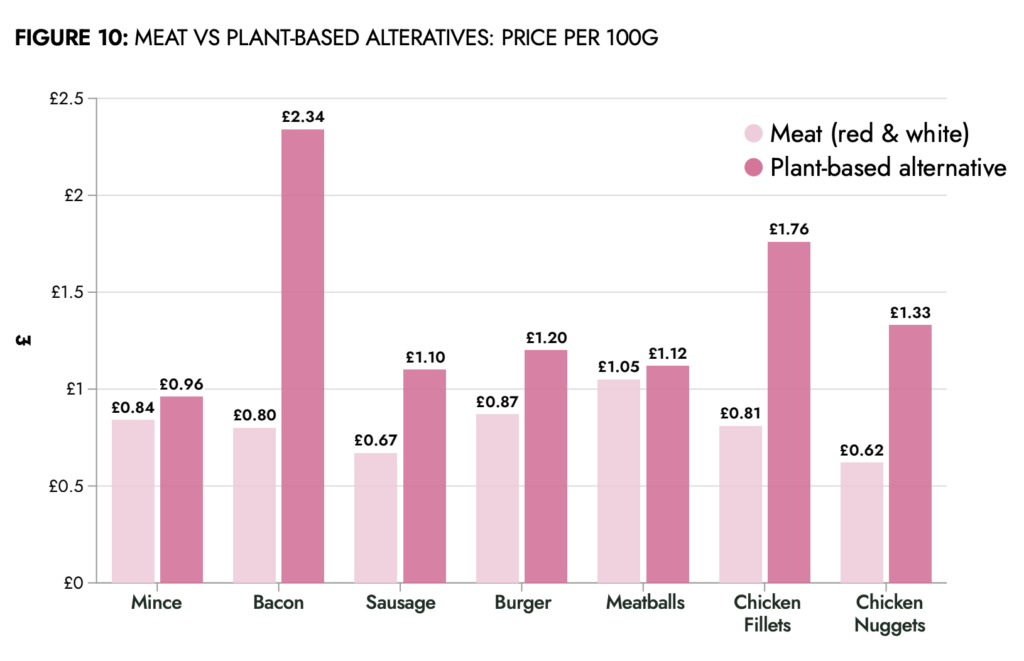
UK should cut animal consumption with beans and blended meat
The report has a bunch of recommendations for different stakeholders in the industry. If you’re an investor, consider the fact that alternative proteins offer the highest CO2e savings per dollar of invested capital of any industry – three times higher than cement, transport or aviation – according to Boston Consulting Group.
For food manufacturers, restaurants and retailers, ensuring price parity for alternative proteins would be a major step forward, as would setting sales-based targets for plant proteins – several supermarket groups in Europe have already done so. These entities should also reformulate products that are high in salt or other unfavourable health metrics, so they’re on par or even more nutritious than meat.
Running cross-product promotions like meal deals and set menus for plant-based food, increasing the ratio of plant-rich foods to meat-based ones, and innovating with blended meat – mixing meat with alternative proteins, as Quorn is doing with the NHS – are all beneficial to this sector.

There’s a real focus on promoting unprocessed proteins like beans, which the report says represents a “win-win-win” for environmental, health and equity outcomes. Making beans more appealing via marketing strategies is key, especially since the consumption of these foods isn’t patterned by income levels.
As for policymakers, they should focus on strengthening procurement in schools and hospitals; introduce mandatory reporting of protein ratios for large companies; extend the VAT exemption of plant-based milks; and recognise the need to eat less meat as part of its climate strategy.
The UK government was also urged to reject EU proposals to outlaw the use of dairy-related terms on plant-based product labels, connect alternative protein development with public health goals, improve the regulatory system for new products, and build on its investments into this sector.
There has been some progress on the latter – earlier today, it was announced that UK Research & Innovation has invested £12M in a new National Alternative Protein Innovation Centre, which aims to develop and bring to market plant-based, cultivated and fermentation-derived proteins.
Speaking to Green Queen, Dr Stella Child, research and grants manager at the Good Food Institute (GFI) Europe, said that to ensure the UK remains competitive internationally, “the new government needs to build on the country’s growing scientific expertise and invest £100M a year in R&D and creating the infrastructure British alternative protein companies need”.

